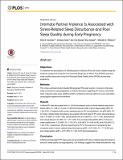Intimate Partner Violence Is Associated with Stress-Related Sleep Disturbance and Poor Sleep Quality during Early Pregnancy

View/
Author
Sanchez, Sixto E.
Islam, Suhayla
Zhong, Qiu-Yue
Published Version
https://doi.org/10.1371/journal.pone.0152199Metadata
Show full item recordCitation
Sanchez, Sixto E., Suhayla Islam, Qiu-Yue Zhong, Bizu Gelaye, and Michelle A. Williams. 2016. “Intimate Partner Violence Is Associated with Stress-Related Sleep Disturbance and Poor Sleep Quality during Early Pregnancy.” PLoS ONE 11 (3): e0152199. doi:10.1371/journal.pone.0152199. http://dx.doi.org/10.1371/journal.pone.0152199.Abstract
Objectives: To examine the associations of Intimate partner violence (IPV) with stress-related sleep disturbance (measured using the Ford Insomnia Response to Stress Test [FIRST]) and poor sleep quality (measured using the Pittsburgh Sleep Quality Index [PSQI]) during early pregnancy. Methods: This cross-sectional study included 634 pregnant Peruvian women. In-person interviews were conducted in early pregnancy to collect information regarding IPV history, and sleep traits. Adjusted odds ratios (aOR) and 95% confidence intervals (95%CIs) were calculated using logistic regression procedures. Results: Lifetime IPV was associated with a 1.54-fold increased odds of stress-related sleep disturbance (95% CI: 1.08–2.17) and a 1.93-fold increased odds of poor sleep quality (95% CI: 1.33–2.81). Compared with women experiencing no IPV during lifetime, the aOR (95% CI) for stress-related sleep disturbance associated with each type of IPV were: physical abuse only 1.24 (95% CI: 0.84–1.83), sexual abuse only 3.44 (95%CI: 1.07–11.05), and physical and sexual abuse 2.51 (95% CI: 1.27–4.96). The corresponding aORs (95% CI) for poor sleep quality were: 1.72 (95% CI: 1.13–2.61), 2.82 (95% CI: 0.99–8.03), and 2.50 (95% CI: 1.30–4.81), respectively. Women reporting any IPV in the year prior to pregnancy had increased odds of stress-related sleep disturbance (aOR = 2.07; 95% CI: 1.17–3.67) and poor sleep quality (aOR = 2.27; 95% CI: 1.30–3.97) during pregnancy. Conclusion: Lifetime and prevalent IPV exposures are associated with stress-related sleep disturbance and poor sleep quality during pregnancy. Our findings suggest that sleep disturbances may be important mechanisms that underlie the lasting adverse effects of IPV on maternal and perinatal health.Other Sources
http://www.ncbi.nlm.nih.gov/pmc/articles/PMC4811406/pdf/Terms of Use
This article is made available under the terms and conditions applicable to Other Posted Material, as set forth at http://nrs.harvard.edu/urn-3:HUL.InstRepos:dash.current.terms-of-use#LAACitable link to this page
http://nrs.harvard.edu/urn-3:HUL.InstRepos:26860175
Collections
- SPH Scholarly Articles [6362]
Contact administrator regarding this item (to report mistakes or request changes)


